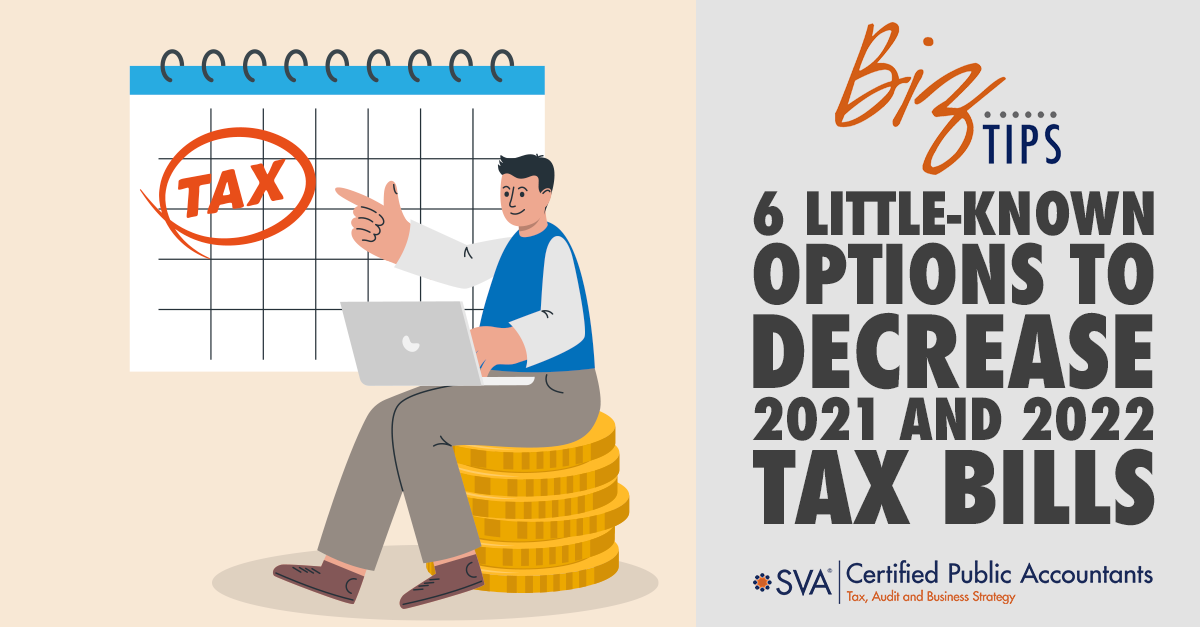The filing deadline for 2021 is just around the corner. Many people who know they will owe the IRS drag their feet and wait to file until the last minute—you are not alone! Roughly one-third of Americans will wait until the deadline to file their taxes. Of those, about 10% know they will owe money to the IRS, so they are not excited to file.
However, waiting to file does not change your deadline to make a tax payment. The deadline for 2021 taxes is April 18, 2022, which means you must pay any amount you owe by that date.
6 Options to Decrease Your Tax Bill
If you have not yet filed, you might have some opportunities to revisit your tax return one more time to look for ways to save money. You can use these insights not only this year but also in the future. These items might not apply to you this year if you have already filed but now is the perfect time to start planning for the 2022 tax year.
1. Depreciation
Depreciation is a tax benefit for business owners. It allows you to deduct a portion of an asset’s value over the useful life of that asset. However, you can also elect to deduct the value of all of the assets in one year. If you placed something in service this year, you need to decide if you will depreciate the whole value of the asset or depreciate it over time.
This quick depreciation can be very helpful if you have a big tax bill this year. However, if you know you will make more money next year, it might make sense to hold off on depreciating the whole asset and take the depreciation expense over time.
There are specific rules that set out when you can use “bonus” depreciation and when you can use section 179 depreciation. Applying these depreciation expenses strategically can help you save significant money at tax time.
2. Required Minimum Distributions
Required minimum distributions (RMD) can be a headache for those who do not need to take money from their retirement accounts to use on living expenses. In those situations, you have to take money you actually do not need, and then you get taxed on it.
You can avoid this type of situation by donating your RMD directly to charity. If you do this correctly, you do not have to pay income taxes on your RMD because your charitable contribution (called a “qualified charitable distribution”) is not considered income. For some, it can decrease their adjusted gross income enough to keep them in a lower tax bracket—and allow them to take the standard deduction as well.
3. Donor-Advised Funds
A donor-advised fund (DAF) is an account that is established for charitable giving. Donors can make contributions to gain an immediate tax deduction. Then, they can establish grants over time, whenever the donation makes sense.
Essentially, any money that goes into the fund is an immediate tax deduction, but you do not have to provide the money directly to any charity right away. Instead, you can structure your giving however you would like, without delaying the tax benefit.
4. Opportunity Zone Investments
If you have (or are expecting to have) a large capital gain in a single year, you might want to consider investing in an opportunity zone. Opportunity zone investments defer tax liability to another year (until December 31, 2026).
An opportunity zone investment was created by the Tax Cuts and Jobs Act of 2017. It gives certain advantages to investment opportunities in lower-income areas. Finding these investment opportunities and using them correctly can be tricky, so be sure to talk with an experienced tax professional about whether this option makes sense for you.
5. Retirement Planning
Retirement planning is certainly not a new tax benefit. However, many taxpayers forget about it as a tax-savings mechanism. Contributing the maximum amounts to tax-sheltered retirement accounts can help you save a lot of money, both on your annual taxes and in the future.
Roth retirement accounts (both 401(k)s and IRAs) are ways to pay taxes now and then take the earnings from the account tax-free in your retirement years. If you are under certain income limits, you can take advantage of this “long-haul” tax strategy.
You can also contribute to a traditional 401(k) and IRA pretax as well. Keep in mind that you can contribute until your tax filing date for 2021.
The contribution limits will increase in 2022. For 401(k) and 403(b) accounts, the limit will increase to $20,500, with a $6,500 “catch-up” contribution permitted for taxpayers over the age of 50 (by the end of the tax year).
6. Real Estate Investing: Section 1031 Exchanges
If you are a real estate investor, you may have sold one or more properties in 2021. With the hot real estate market this past year, selling may have resulted in huge capital gains. If you are in this boat, you might want to consider taking advantage of Section 1031.
Section 1031 allows you to avoid capital gains taxes when you invest in “like-kind” investments within a certain time period of incurring the gain. For real estate investors, that simply means that you need to buy another property within a specific amount of time.
The requirements for Section 1031 exchanges can be complex, so work with a tax professional to ensure you get this process right.

© 2022 CPA ContentPlus

